Enjoying "Macbeth", by William Shakespeare
by Ed Friedlander, M.D.
efriedlander@wmcarey.edu
|
Warning: Macbeth is supposed to upset people.
It shows
life at its most brutal and cynical, in order to ask life's toughest question.
This page deals with all this without apology.
I have a high regard for truth and I talk plain.
If you want something nice, please leave
now.
Please note: I am the author of all the material on this page.
My work has been used without my permission or acknowledgement
by around a dozen other people (Google search September 26, 2009),
including several sites offering it for sale.
This one is the original site.
| |

|
 | |
If you are a student assigned to read or see Macbeth, or
an adult approaching it for the first time, you
are in for a lot of fun.
Everybody brings a different set of experiences to a book,
a theater, or a classroom. Although I've tried to help,
ultimately you'll need to decide for yourself about Shakespeare
and Macbeth.
I hope you enjoy it as much as I do!
|
This Is NOT "Family Entertainment."
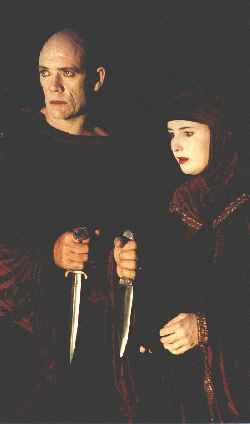 Young people
who know of Shakespeare
from "Shakespeare Gardens" and "Beautiful Tales for Children"
may be surprised by what happens in Macbeth.
Young people
who know of Shakespeare
from "Shakespeare Gardens" and "Beautiful Tales for Children"
may be surprised by what happens in Macbeth.
- When we first hear of Macbeth, he has just cut an enemy
open ("unseamed") from belly button ("nave") to throat ("chops").
The king shouts "Oh valiant cousin! Worthy gentleman!"
- At their party, a witch shows her friends
the chopped-off thumb
of a ship's pilot wrecked on his way home.
-
A witch tried to bum some chestnuts from a lady.
The lady called her a witch. This made the witch angry.
The witch plans to get back at her by causing a nine-day storm
to make her sailor husband miserable. If the ship hadn't been
under divine protection, she'd kill everybody on board.
Another witch offers to help with a bit of magical wind.
The angry witch appreciates this and says, "You're such a nice person."
- Lady Macbeth, soliloquizing,
prays to devils to possess her mind,
turn the milk in her breasts into bile (!), and
give her a man's ability to do evil.
- Lady Macbeth b-tches at her husband and ridicules his
masculinity in order to make him commit murder.
She talks about a smiling baby she once nursed and
what it would have been like to smash its brains out -- she would
prefer this to having a husband who is unwilling to kill in cold blood.
Read the passage again and think about exactly what Lady Macbeth
is saying.
- Lady Macbeth keeps a strong sedative in the
house. She doesn't mention this to her husband
even when they are planning a murder. She just uses it.
Attentive readers will
suspect she has had to use on Macbeth in the past.
- The Macbeths murder a sleeping man, their
benefactor and guest, in cold blood, then
launder their bloody clothes. They smear blood on
the drugged guards, then slaughter them to
complete the frame-up.
- Horses go insane and devour each others' meat while they
are still alive.
- Everybody knows Macbeth murdered Duncan, but they
make him king anyway. Virtuous-talking Banquo ("Let's
have a thorough investigation sometime") acquiesces to murder,
confirming what every teen knows about adult hypocrisy.
(In Holinshed, Banquo is Macbeth's accomplice. Since Banquo was
supposed to be the ancestor of Shakespeare's own king James I,
this wouldn't really do.)
Lennox plays both sides, and probably others do as well.
Ross is in a big hurry to leave Macduff's castle.
Is this to
"maintain plausible deniability" just before
the appearance of the assassins,
who he actually brought?
- Macbeth sees Banquo's ghost with twenty skull
injuries, any one of which could be fatal.
He goes psychiatric and screams "You can't prove I did it."
He goes on about how he used to think that once somebody's
brains were out, he'd stay dead. But now
he'll need to keep people unburied until the
crows eat the corpse like roadkill, etc., etc.
- Witches deliver incantations ("Double, double,
toil and trouble... bubble etc.") that can stand alongside any
meaningless-inferential heavy-metal rock lyrics.
- Among the ingredients of a witches' brew are
cut-off human lips and a baby's finger. It's not just any
baby -- it was a child delivered by a prostitute in a ditch,
and that she strangled right afterwards. (This kind of thing
happens in our era, too. No one knows how often.)
-
I'm an autopsy pathologist.
I am very familiar with how
human bodies decompose.
To show Macbeth his future, the witches add to
the brew "grease that's sweated from the murderer's
gibbet."
Would you like to
know what that means?
The bodies of executed murderers were left
hanging on the gallows / gibbet, often caged so their friends
couldn't take them away, until they were
skeletonized, a process that takes weeks. At about ten days
in suitable weather, there are enough weak points in
the skin that the bodyfat, which has liquefied,
can start dripping through. There will be a puddle
of oil underneath the body. This is for real.
- Macduff's precocious little son
jokes with his mother about how there
are more bad than good people in the world, and adds
some wisecracks at the expense of her own possible morals.
Moments later, the bad guys break in and
stab him to death.
- "Who would have thought the old man
would have so much blood in him?"
Lady Macbeth goes psychiatric (definitely) and commits
suicide (maybe). Hearing of this, Macbeth just says
"She should have died hereafter", meaning "She
should have picked a different time to die."
He then launches into English literature's
most famous statement of the meaninglessness of life.
He considers
suicide, which the Romans considered the dignified
thing to do under such circumstances. But he decides
it would be more satisfying to take as many people as
possible with him.
For the word "juggling",
see I Henry VI 5.iv.
- Macduff recounts how he was cut out of his mother's
uterus at the moment of her death. In a world without
anesthesia or safe surgery (i.e., both Macbeth's and Shakespeare's),
if a woman was unable to
deliver a child due to its being too large to pass through
the birth canal, both she and the child would die unless
a "cesarean section" was performed. The mother's abdomen
and uterus were cut open and the child removed.
It also had to be done before the mother
went into severe shock, so she would be fully conscious when it
while it was being done. Of course she would die soon afterwards.
Shakespeare's audience knew this.
- Macbeth's head ends up on a stick. All teens know
that severed heads
were probably the first soccer balls. If you
are directing the play, this is a nice touch.

The Real Macbeth and His Times
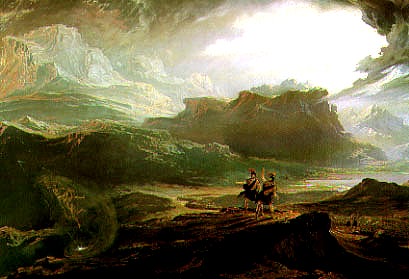 Shakespeare got his story from Raphael Holinshed's Chronicles.
You'll need to decide for yourself whether Shakespeare himself knew the
story was already fictionalized; Shakespeare's altered it again to
clear Banquo, King James's legendary ancestor, of complicity in the murder.
It's a fun read. Click here
to read Holinshed.
Holinshed spends a lot of time on the incident in which
Malcolm (who became a popular king) tests Macduff
by pretending to be mean when he is really nice.
Holinshed talks about the murder of King Duff by Donwald
in the century before Macbeth. According to Holinshed,
Donwald
was nagged by his wife until he did the evil deed, and drugged the guards.
Shakespeare adapted this for Macbeth.
Shakespeare got his story from Raphael Holinshed's Chronicles.
You'll need to decide for yourself whether Shakespeare himself knew the
story was already fictionalized; Shakespeare's altered it again to
clear Banquo, King James's legendary ancestor, of complicity in the murder.
It's a fun read. Click here
to read Holinshed.
Holinshed spends a lot of time on the incident in which
Malcolm (who became a popular king) tests Macduff
by pretending to be mean when he is really nice.
Holinshed talks about the murder of King Duff by Donwald
in the century before Macbeth. According to Holinshed,
Donwald
was nagged by his wife until he did the evil deed, and drugged the guards.
Shakespeare adapted this for Macbeth.
I've read that Holinshed's section on Macbeth was largely derived from
the work of one Hector Boece, Scotorum Historiae ("Chronicles
of Scotland", 1526-7, translated from Latin into English by a John Bellenden in 1535).
It is evidently not online.
I've also
read that Boece's sources include the Chronica gentis Scotorum
("Scotichronicon") by John of Fordun in the early 1500's
(he also writes about William "Braveheart" Wallace and Robin
Hood), and Andrew of Wyntoun (1400's). John of Fordun seems to have
been the first to record
the story of the dialogue on kingship between Macduff and
Malcolm. You may be able to find this book in an old university
library, but I could not find it online.
By the time the story
of Macbeth had reached Holinshed, it was already mostly fiction.
Here's what we think really happened
with Macbeth and the other characters.
In a barbaric era, population pressures
made war and even the slaughter of one community
by another a fact of life. Survival depended in having a
capable warlord to protect life and property, prevent
infighting, and protect from distant enemies.
Groups of warlords would unite under the nominal leadership
of one king to promote their common interests and war on
more distant nations. While people pretended to believe in
"the divine right of kings" and "lawful succession",
continuing effective leadership was assured by warlords killing
off the less capable family members.
The name "Macbeth" means "son of life",
and is a Christian name rather than a patronymic (hence the "b"
is lower case.) Macbeth would have signed
his friends' high school
yearbooks "Macbeth mac Findlaech"
(McFinley). There are MacBeth families in Scotland and Nova Scotia.
Macbeth's father Findlaech was ruler ("mormaer",
high steward) of
Moray, at the northern tip of Scotland.
Macbeth's mother's name is unknown, but she
is variously said to have been the daughter of King Kenneth II
or the daughter of King Malcolm II.
In 1020, Findlaech
was killed and succeeded
by his nephew Gillacomgain.
In 1032, Gillacomgain and fifty other people were burned
to death in retribution for the murder of Findlaech,
probably by Macbeth and allies.
The historical Mrs. Macbeth was not named "Lady", but "Gruoch"
(GROO-och). She was the daughter of a man named Biote (Beoedhe),
who was in turn the son of King Kenneth III "the Grim" who Malcolm II
had killed to become king. (Some say
that Biote was the son
of Kenneth II instead.) She was originally
married to Gillacomgain.
Their son was
Lulach the Simple (i.e., stupid;
no, Lady Macbeth didn't brain him.) After Macbeth
killed Gillacomgain, he took his widow Gruoch for his own wife,
and raised Lulach as
their stepson. What a guy!
Centuries before Macbeth, King Kenneth MacAlpin,
"founded Scotland" by uniting
the Picts and the Scots, i.e., getting them to fight
foreigners rather than each other.
In this era, Gaelic custom
required that the succession
go via the male line, and that if an heir was not
yet old enough to reign when the king died, the kingship
went to whatever male adult was next in line.
Since the succession was designed to ensure some stability
in a world of warlords and infighting, this made sense.
Kenneth MacAlpin's male line continued to
King Malcolm II, who had at least two daughters but no sons,
and he killed the last member of the male McAlpin
line.
One daughter, Bethoc, (Holinshed calls her Beatrice)
married Abbanath Crinen, the secular hereditary abbot
of Dunkeld, and gave birth to Duncan.
In 1034, Malcolm II was murdered at Glamis by
his fellow warlords, possibly including
his grandson Duncan. Then
Duncan managed to kill
his rivals and seize the throne.
Duncan married Sibylla Bearsson and they
had Malcolm and Donald "Bain".
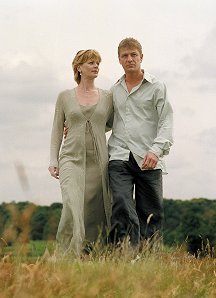 Macbeth allied with
Thorfinn of Orkney, a Norseman. Thorfinn was
the son of Sigurd the Fat and Bethoc,
apparently the same Bethoc who was Duncan I's
father. Thorfinn Sigurdsson is variously
called "Thorfinn I", "Thorfinn II", "Thorfinn Skull-Smasher",
"Thorfinn the Black", and "Thorfinn Raven-Feeder" (ravens eat
dead meat, including human corpses).
Thorfinn and Macbeth defeated and killed
Duncan I in a battle in Elgin in August 1040.
Thorfinn ruled northern Scotland, and Macbeth ruled southern
Scotland. According to accounts, Macbeth was a good king,
strict but fair, for the first decade of his reign.
Macbeth allied with
Thorfinn of Orkney, a Norseman. Thorfinn was
the son of Sigurd the Fat and Bethoc,
apparently the same Bethoc who was Duncan I's
father. Thorfinn Sigurdsson is variously
called "Thorfinn I", "Thorfinn II", "Thorfinn Skull-Smasher",
"Thorfinn the Black", and "Thorfinn Raven-Feeder" (ravens eat
dead meat, including human corpses).
Thorfinn and Macbeth defeated and killed
Duncan I in a battle in Elgin in August 1040.
Thorfinn ruled northern Scotland, and Macbeth ruled southern
Scotland. According to accounts, Macbeth was a good king,
strict but fair, for the first decade of his reign.
In 1054, Earl Siward of Northumberland,
who spirited Malcolm to England after Duncan's death,
invaded Scotland. According to the Anglo-Saxon chronicle,
he met and defeated Macbeth at the battle of Birnam
Wood / Dunsinane (July 27). Most of Macbeth's army
were killed, but Macbeth escaped. Siward's son
and nephew were also killed. According to the Chronicles
of Ulster, Macbeth
continued to reign and was actually killed in 1057
by Duncan's son Malcolm at Lumphanan near Aberdeen. Thorfinn II survived until
1064.
After Macbeth's death, Lulach claimed the kingship
and had some supporters.
Lulach was ambushed and killed
a few months later by Malcolm.
Malcolm went on to reign as Malcolm III "Canmore" ("big head"
or "great ruler").
He took Thorfinn's widow Ingibiorg for himself,
and they had a son Duncan, who later ruled as Duncan II.
After Ingibiorg died, Malcolm Canmore married Margaret, a
princess of the old English royal family. Margaret
was a woman of great personal piety, and is now
honored as a saint
by Roman Catholics and Anglicans. Three of their sons
became kings in their turns.
Malcolm Canmore was an aggressive and successful
warrior who invaded
England several times. He was finally killed
in Northumberland. The story is that
a treacherous soldier, pretending to hand him a
key on a spear, put the spear through his eye socket.
Donald Bane,
was king twice (deposed for a time by Duncan II,
who he later defeated and killed). Donald Bane
was finally defeated, imprisoned, and blinded
by King Edgar, one of the sons of Malcolm Canmore
and Margaret.
Boece, from a Roman
Catholic source

Banquo and Fleance Never Existed
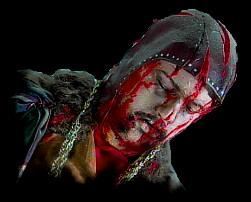 |
Banquo
(Banquho, "Thane of Lochabar") and Fleance are supposed to be
the ancestors of the Stewarts (Stuarts), including some kings of Scotland
and later Scotland-and-England. After Banquo's
murder by Macbeth's assassins,
Fleance fled to North Wales,
and married one Nesta / Mary, daughter
of Gryffudth ap
Llewellyn, Prince of Wales.
Walter
the Steward, first
"High Steward of Scotland" and the
historical founder of the Stewart
line, was supposedly their son.
This is all bunk. Walter's real name was
"Walter Fitz Alan Dapifer", son of
Alan Dapifer, the sheriff of Shropshire. The sheriff was the
son of some ordinary folks.
For some reason, perhaps to give
his own Stuart king some more glamorous ancestors,
Boece made up Banquo and Fleance.
Check out the old Scottish genealogies online. You'll
find nobody matching their descriptions.
|
Joe Cochoit explains
how we know Banquo and Fleance are fictitious.
Mr. Jensen explains
explains how the riddle was solved, and the true ancestry of the Stuarts
became clear. As usual, the truth is far more interesting than fiction.
According to Holinshed, Macbeth's parents were
Sinel, Thane of Glamis (whose existence is otherwise
unattested) and a daughter of Malcolm II
named Doada (again, modern genealogies mention
no such person.)

Some Story Details
Lady Macbeth's lie 'What, in our house?' would have
given the game away to even the stupidest detective,
but somehow no-one picks up on it.
If you're here, you already know the plot of Macbeth, or
can find it from the links. Here are some things to notice.
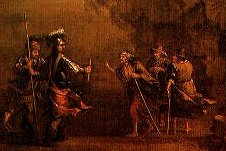 The three witches remind English teachers of the three Fates
of Greek mythology and the three Norns of Norse mythology.
"Weird" (as in "weird sisters") used to mean "destiny" or "fate".
Perhaps in an older version they were.
The three witches remind English teachers of the three Fates
of Greek mythology and the three Norns of Norse mythology.
"Weird" (as in "weird sisters") used to mean "destiny" or "fate".
Perhaps in an older version they were.
At the beginning, Duncan I is not leading either of his people's armies.
He is not even present for Cawdor's execution.
This is a good way for a king to get himself replaced quickly.
A blood-drenched captain reports that Macbeth and Banquo have
just defeated the rebellious Macdonwald (MacDonald, E-I-E-I-O).
Ross and Angus then enter and announce that "Bellona's bridegroom,
lapped in proof" has defeated the Thane of Cawdor and the Norwegians
at Fife. Holinshed credits Macbeth with both of these victories,
but let's think. Macbeth cannot have fought two battles 500 miles
apart at the same time, and in the next scene he knows nothing
about the Thane of Cawdor's disloyalty.
Macduff is thane of Fife. If "lapped in proof"
is a mistake for "brave Macduff" or "Lord Macduff",
then the whole scene makes more
sense, and Shakespeare introduces the conflict between the two men
early. (In Holinshed, Macbeth does fight both battles.
Shakespeare is, as he often does, telescoping time.
For the stage, perhaps "brave Macduff" does work better.)
Duncan gives Cawdor's title and property to Macbeth. (If
Macduff defeated the Thane of Cawdor, then
Macduff should have gotten the title. Is Duncan again
showing incompetence?)
Update 2010: The Folger "supernatural horror" production available on DVD uses
"brave Macduff".
Malcolm was not yet of age, and Duncan's declaring him heir was an impediment
to Macbeth's claim on the throne via his mother. Holinshed
points this out.
As soon as Macbeth thinks of murdering Duncan, he says to Banquo, "Let's talk about this confidentially."
This happens again before the dagger scene. However, Shakespeare's Banquo only
becomes Macbeth's accomplice by his acquiescence afterwards.
Nothing is what it seems. This begins with Macbeth's beautiful castle and gracious hostess.
When Duncan talks about the nice air and the nice birds at Macbeth's castle,
Banquo -- very much the butt-kisser -- immediately agrees in a way
that will make the king think that Banquo thinks that the king is a good
observer of nature.
You'll have to decide for yourself whether Macbeth begins the play as a "nice guy."
Unlike Hamlet, Othello, and King Lear, no one seems to genuinely admire
or love him except as a warlord. Lady Macbeth famously says he is full of the milk of human kindness,
which she dislikes. In considering the murder, Macbeth
seems most worried about the dangers and disadvantages to himself.
You may enjoy listing these. ("Maybe destiny will make me king
without murdering anyone." "It would be more fun to enjoy my
current success and popularity for a while." "I'll go to hell."
"Duncan is a good man and people won't like his killer." "I might get caught red-handed."
"Somebody will assassinate me in turn.")
Do you think he's also considering that
what he's doing is wrong? Different people will reach different conclusions.
Notice that on the morning of the day Banquo gets
murdered, Macbeth asks him three times where he is going
and whether his son will be with him. Banquo should have
been more suspicious.
After the banquet,
every one of the other warlords in Scotland knows that Macbeth
killed Banquo for no good reason, and that he is mentally imbalanced,
and that they are themselves in danger.
My friend Ian Brown offered an idea that seems ingenious.
Much of what goes on in this short play is what is NOT said.
In the scene after the banquet, the Macbeths have become distant from
one another. They say little of consequence, as in a marriage that
both parties know has failed. Brown suggests that Lady Macbeth writes
a letter warning her friend, Lady Macduff, about her husband. This explains
the appearance of the messenger to warn Lady Macduff just before she is killed --
this episode does not contribute otherwise to the drama -- and
afterwards, Lady Macbeth's repetitive writing during her sleepwalking.
My cyberfriend Kyle Reynolds wrote to remind me that most (all?)
of the actual murders occur off-stage, since without any
between-act curtains, the story had to be written so that somebody
would remove a dead body
from the stage. Thanks.
People suspect Malcolm and Donalbain because they
ran away.
No white Bronco though.
-- Rodger Burnich (link is now down)

The Background
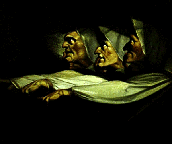 Around 1950, scholars noticed and argued the obvious. Macbeth
was written specifically to be performed for, and to please,
King James I.
Around 1950, scholars noticed and argued the obvious. Macbeth
was written specifically to be performed for, and to please,
King James I.
James Stuart was already King James VI of Scotland when
Queen Elizabeth's death
made him James I of England as well. In the late 1500's,
Scotland had a witch craze, with many people convicted of
wicked secret practices without physical evidence.
James I, who believed the witch hysteria, wrote
a book about the supposed hidden world of
wicked witches, entitled Demonology.
The witch persecutions were a monument to human
stupidity. James may have really believed that there was a secretive
sect devoted to malicious evil. Or he may have been just another
cynical politician trying to unite people against a common
imagined enemy with different cultural practices.
Perhaps the truth is somewhere in the middle.
Whatever indigenous/pagan beliefs and practices
may really have existed in Macbeth's Scotland,
the "witches" of the play are obviously there for their role in
Macbeth's fictionalized story.
Stephen Greenblatt's "Will in the World" (highly recommended,
a book about Shakespeare's times and how he must have been
influenced by contemporary events) explains some puzzling features
of our play.
- Henry Garnet, a Jesuit and priest who was implicated in the Gunpowder
Plot, wrote A Treatise of Equivocation about how to
mislead and answer ambiguously under oath. He was executed.
He may be the "equivocator
that could swear in both the scales against either scale,
who committed treason enough for God's sake, yet could not
equivocate to heaven." Of course, the witches "equivocate" with
Macbeth in reassuring him that he will not be vanquished until the forest
moves, and not be killed by anyone born of woman.
- A Matthew Gwynn held a pageant to greet James I, in which three boy-actors
played Sibyls and prophecied his future greatness and mentioned Banquo.
- James supposedly told John Harrington that before the execution of his
mother, Mary Queen of Scots, there was an apparition of "a bloody head
dancing in the air".
- An accused witch named Agnes Thompson, who had been tortured,
told James and his court that on Halloween of 1590, two hundred witches
had sailed into the town in sieves.
- In his book on witches, James wrote that they would give deceptive and double-meaning
prophecies.
Macbeth deals with the fictional
ancestors of the Stuart line (Banquo, Fleance) and presents Banquo
more favorably than did the play's sources. (In Holinshed,
Banquo is Macbeth's active accomplice.) The procession of kings
ends with a mirror (probably held by Banquo rather than
another king, as in some notes.)
James could see himself, thus becoming part of the action.
Macbeth
says he sees more kings afterwards. Shakespeare has turned the
nature spirits of his sources into witches for the
witch-hunting king's enjoyment.
|

Evil? Predestination?
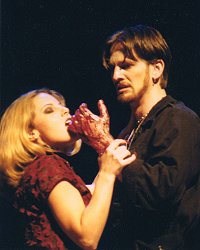
| You may be asked, "What is the nature of evil in
"Macbeth"? Again, you'll need to decide for yourself.
Shakespeare only uses the word "evil(s)" in the England
scene, and only uses it to refer to bad deeds and bad character
traits. (The "King's Evil" for which Edward touches people
was scrofula, a mycobacterial infection of the cervical lymph nodes.
There was an old superstition that it could be cured by the touch of a king.
James I, for whom the play was probably performed,
also touched for scrofula because his English advisors told him
the people wanted it. William III told a man
who asked for his touch, "May God give you better health and better sense.")
Some people will decide that the Macbeths are victims of supernatural
forces beyond anybody's control. Other people will decide that the talk
about predestination simply reflects the folk-tale,
or that the Macbeths'
era and/or their outlook on life guarantee that something really bad will happen
to them.
Perhaps despite the supernatural trappings of witches and talk about
devils, "evil" for Shakespeare is nothing more or less than
bad human habits and behaviors. You decide. |

Are You a Man?
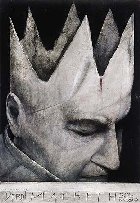 As you go through the play, look for the repeated theme of
"What is a real man?" Like nowadays,
there is no consensus.
As you go through the play, look for the repeated theme of
"What is a real man?" Like nowadays,
there is no consensus.
- Lady Macbeth, misogynist, wants to lose her femininity so she
can be cold-blooded and
commit murder like a man does.
- Macbeth, having second thoughts,
tells his wife that it's unmanly
to murder your benefactor while he is asleep. Lady Macbeth gets
abusive and tells him this will make him more of a man.
- Macbeth flatters his wife, saying she has such
"undaunted mettle" that she won't have any
baby girls, only baby boys.
- Macbeth, perhaps having learned from his wife,
gets two men to commit his murder by insulting
their masculinity.
Macduff leaves his wife and children in danger while he goes
(as everybody must realize) to plot against Macbeth with Malcolm
and the English.
Lots of people talk about Lady Macbeth being "unnatural".
but Lady Macduff complains about her husband leaving his family for the sake
of his country as being "unnatural" (he lacks "the natural touch")
and his unmanly flight against "against all reason."
For her, he's dead, or less of a man than a wren is.
What do you make of this?
- Malcolm tells Macduff -- who has just learned about the murder of his family -- to bear his sorrow like a man.
Macduff replies he must also feel it as a man does, i.e., he IS a man
because he has feelings.
- Siward's son becomes a man in his father's eyes
the day he falls in battle
There are others.
You can get a good paper out of this.

Who Was the Third Murderer?
People have had lots of fun trying to figure out who the Third
Murderer really is. It's evidently somebody who knows Banquo and
Fleance. The usual suspects include Macbeth, Lady Macbeth,
or a servant or thane. All these people are supposed to show
up momentarily at Macbeth's dinner party, without bloodstains.
My ingenious cyberfriend Tanner Campbell
suggested it is one of the witches.
She can blow out a torch by supernatural means, and their
participation could assure
the survival of Fleance and thus the success of her prophecy.
Shakespeare actually needed to set the scene for a murder.
He does not have a modern filmmaker's repertoire. (Macbeth's
mutterings would be today's voice-overs.) So to set the scene,
he had to use dialogue.
Macbeth pays spies in each of his warlords' castles, so he has
other people available. It seems reasonable that he would send
somebody knowledgeable to help two disenfranchised persons (not professional
hit men) kill a mighty warrior and his teenaged son. It is also
unlikely that he would want to introduce the assassins to each
other ahead of time.
The Third Murderer does not come back with the others to collect his
fee, because he was probably played by one of the minor actors who
were party guests and would need to be changing costume.
My correspondent Matthew Houston reminded me that the Third Murderer
is someone familiar with Banquo's habits ("... he usually does ... ")
and suggests the First Murderer put out the light because he
answers evasively when the Third Murderer asks "Who did strike out the light?"
I am wondering whether the First Murderer was reluctant to kill a child.
In other words, you will have to decide for yourself!

|
Is Macbeth bad luck?
Producing Macbeth is
supposed to be unlucky. Fires, falls, and weapon injuries
have plagued past productions.
Superstition requires
those involved in productions not to say the play's
title, but rather "The Scottish
Play". There are silly urban legends about the boy actor who
first played Lady Macbeth getting sick and Shakespeare
having to fill in, and Queen Anne closing the theaters
after people thought the deviltry of the play had
caused a bad storm.
Some people think that the play's vision of evil,
with witches, demonic familiars, and so forth explains
the bad luck. You will have to decide for yourself.
The
Curse by
Ivanov is now down. It dealt with
theatrical superstitions. The accidents are more common because
the stage is dark, there's fire scenes,
the fog machine makes the stage slippery, there's more wielding of
crude weapons by more people, and so forth. Link is now down.
A correspondent in 2002 reminded me that failing acting companies
would produce "Macbeth", which was very popular, as a last-ditch,
not-always-successful way of staying in business. A correspondent in 2003
told me that saying the name of the play was bad luck but that people
avert this by a prayer/apology to the "Muse of the Theater", i.e., Melpomene
(mell-POMM-eh-neh or --eeny; portfolio is tragedy, Thalia is comedy).
"Did the Greeks really believe in their mythology?" Who knows?
If you would like a different counterspell, let me suggest this.
Those wishing to participate join hands in a circle, and one member says,
"May those who work on this production, and those who see it,
be guided to choose peace over violence, love over vanity,
and hope over despair." All say, "Amen."
|

|

A Rooted Sorrow
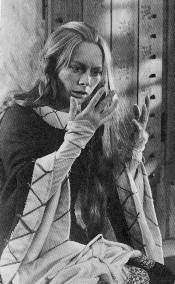 Previous stage villains, notably Shakespeare's Aaron and Richard III,
do not reach the Macbeths' depth. Aaron gloats on his misbehavior,
and Richard acts the villain until the end.
Your instructor may talk about Macbeth beginning as a good and fine
man, possessing the tragic flaw of ambition,
upsetting the divinely-ordained natural order, and so
forth. You'll need to decide for yourself about this.
On the one hand, the other characters talk about Duncan
as being "meek", very likable and kindly, and so forth.
And people do seem to be dismayed over the murder.
On the other hand,
Macbeth seems -- from the play's bloody beginning --
to be one of many thugs
in a society in which power is gained and maintained by
killing other thugs, and where loyalty is at best provisional.
Lady Macbeth doesn't seem to think
that there's anything really unusual about the idea of
murdering a guest, and she assumes it's occurred to her husband
as well. You could get a good paper by arguing one side, or both --
does Shakespeare believe that there is a deep morality underpinning
human society, or does he not believe this, or does he let you decide?
Previous stage villains, notably Shakespeare's Aaron and Richard III,
do not reach the Macbeths' depth. Aaron gloats on his misbehavior,
and Richard acts the villain until the end.
Your instructor may talk about Macbeth beginning as a good and fine
man, possessing the tragic flaw of ambition,
upsetting the divinely-ordained natural order, and so
forth. You'll need to decide for yourself about this.
On the one hand, the other characters talk about Duncan
as being "meek", very likable and kindly, and so forth.
And people do seem to be dismayed over the murder.
On the other hand,
Macbeth seems -- from the play's bloody beginning --
to be one of many thugs
in a society in which power is gained and maintained by
killing other thugs, and where loyalty is at best provisional.
Lady Macbeth doesn't seem to think
that there's anything really unusual about the idea of
murdering a guest, and she assumes it's occurred to her husband
as well. You could get a good paper by arguing one side, or both --
does Shakespeare believe that there is a deep morality underpinning
human society, or does he not believe this, or does he let you decide?
Of course, the Macbeths end up miserable.
They do not suffer primarily from conscience
(which is not much in evidence in any character, though
Malcolm at least claims to live clean to test Macduff).
They do not suffer from
fear of the afterlife (which Lady Macbeth b-tches out of her husband;
he talks about giving up his "eternal jewel", i.e., his soul,
to the devil simply as an accomplished fact).
Their fear of human
retribution merely drives them to additional murders.
Shakespeare's insight goes far deeper.
So far as I know, this is the first work in English that focuses on
the
isolation and meaninglessness that result from selfishness
and cruelty.
By the end, Lady Macbeth dissociates
from the horror of what she has become. Shakespeare uses insanity
as a metaphor for actually gaining insight in "King Lear" and maybe
elsewhere. Lady Macbeth's insanity is really nothing more than
her realizing the nature and consequences of
the horrible thing she has done. Macbeth verbally
abuses and bullies
the people who he needs to defend him (and who are
abandoning him), while reflecting to himself on
the emptiness and futility of it all. Of course,
the couple no longer have a relationship, and Macbeth
is merely annoyed when she dies.
Kids... this is true to life. Try to live better than the Macbeths did.

What Does It All Mean?
 Fair is foul and foul is fair.
In Macbeth, things are seldom what they
seem, and we often don't know what's really
happening. The play is full of ambiguity and double
meanings, starting with the prophecies.
The day is extremely foul (weather) and
extremely fair (MacDonald has been disemboweled.)
Banquo is not so happy, yet much happier.
Is the dagger a hallucination, or a supernatural phantom?
Ask the same question about Banquo's ghost.
Does the bell summon Duncan "to heaven or to hell"?
One of Duncan's son's called out "Murder!" in his
sleep, but the other one laughed, mysteriously
pleased at his father's death. Which was which?
Liquor "equivocates" with the porter's sexuality.
Does Macbeth say "Had I but died an hour...." because
he is really sorry (i.e.,
sad about his moral deterioration and/or realizing he's getting
himself into trouble),
or just overacting?
Does Lady Macbeth really faint? ("Perhaps she is actually a person
of more sensitive feelings than she lets on.")
Or does she simply pretend to faint to
divert attention from her husband's overacting?
Who's the third murderer?
Is Ross playing both sides?
Is Lennox, who overheard Macbeth's plot against Macduff after the party,
the messenger who warns her too late?
Does Lady Macbeth commit suicide or die of cardiac complications?
What is Lady Macbeth writing
in her sleepwalking scene? A confession? A suicide note? A last love
letter to a neglectful husband?
(My correspondent Terilyn J. Moore, who has taught the play for many years
in high school and also shared the idea about Lennox and Lady Macduff,
tells me that she invites class members to
reproduce what Lacy Macbeth might have written.)
There's a lot of talk about clothing -- clothes give you
an identity and also conceal who you are.
These mysteries add to the literal fog on-stage.
Fair is foul and foul is fair.
In Macbeth, things are seldom what they
seem, and we often don't know what's really
happening. The play is full of ambiguity and double
meanings, starting with the prophecies.
The day is extremely foul (weather) and
extremely fair (MacDonald has been disemboweled.)
Banquo is not so happy, yet much happier.
Is the dagger a hallucination, or a supernatural phantom?
Ask the same question about Banquo's ghost.
Does the bell summon Duncan "to heaven or to hell"?
One of Duncan's son's called out "Murder!" in his
sleep, but the other one laughed, mysteriously
pleased at his father's death. Which was which?
Liquor "equivocates" with the porter's sexuality.
Does Macbeth say "Had I but died an hour...." because
he is really sorry (i.e.,
sad about his moral deterioration and/or realizing he's getting
himself into trouble),
or just overacting?
Does Lady Macbeth really faint? ("Perhaps she is actually a person
of more sensitive feelings than she lets on.")
Or does she simply pretend to faint to
divert attention from her husband's overacting?
Who's the third murderer?
Is Ross playing both sides?
Is Lennox, who overheard Macbeth's plot against Macduff after the party,
the messenger who warns her too late?
Does Lady Macbeth commit suicide or die of cardiac complications?
What is Lady Macbeth writing
in her sleepwalking scene? A confession? A suicide note? A last love
letter to a neglectful husband?
(My correspondent Terilyn J. Moore, who has taught the play for many years
in high school and also shared the idea about Lennox and Lady Macduff,
tells me that she invites class members to
reproduce what Lacy Macbeth might have written.)
There's a lot of talk about clothing -- clothes give you
an identity and also conceal who you are.
These mysteries add to the literal fog on-stage.
Shakespeare chose his subject matter and some plot
details to please James I. But as always, his deeper purpose
seems to be to show us our own lives and make us think.
The key question that Shakespeare seems to ask is this.
Is human society fundamentally amoral, dog-eat-dog?
If so, then Macbeth is right, and human life
itself is meaningless and tiresome.
Or do the hints of a better life such as King Edward's ministry,
Malcolm's clean living,
the dignified death of the contrite traitor, and the doctor's
prescription for pastoral care,
display
Shakespeare's Christianity and/or humanism?
It's a dark play. The light of goodness seems still fairly dim.
But evil always appeals more to the imagination, while in real
life, good is much more fun.
Is the message of Macbeth one of despair, or of hope?
I don't know. You decide.
Citing this page:
To include this page in a bibliography, you may use this format:
Friedlander ER (1999) Enjoying "Macbeth" by William Shakespeare Retrieved Dec. 25, 2003 from http://www.pathguy.com/macbeth.htm
For Modern Language Association sticklers, the name of the site itself
is "The Pathology Guy" and the Sponsoring Institution or Organization
is Ed Friedlander MD.

Links
Sigmund
Freud on the Macbeths. Today's psychiatrists will almost all tell you that Freud's actual
contribution
was taking emotions seriously, listening and trying to understand.
Much of his "theory" is only of historical interest, but you might decide
that some of the "psychoanalytic" writings -- like this one -- are just common sense described
in unfamiliar terms. Thanks to Caitlin Monesmith for finding this link.
Homework Resources
Real History and Shakespeare's Sources
Rewriting (and blatantly falsifying) history for the benefit of
"disenfranchised persons" was very popular in the 1990's.
You can supply plenty of examples from the "political
correctness" movement. (Do you remember the "Beethoven was black"
fiasco as Stanford?)
To cite a benign example, the narrator
of Braveheart begins saying in effect, "You may say
I'm lying, but remember it's the winners who write history." He goes
on to have William Wallace, who was executed in 1305, partying with
Queen Isabella, who didn't come to England until 1309.
Shakespeare
may have subtitled his own Henry VIII "All Is True", to distinguish
it from docudramas like his own Macbeth.
Michael
Davidson on the historical Macbeth
There are scrappy bits of information on Macbeth's actual reign.
It would appear he was a strong ruler who helped unite Scotland,
without any contemporary writers describing him as tyrannical.
In 1045, Duncan's father Crinan was killed in "A battle between the Scots
themselves", (Annals of Ulster) and this event probably represented an
attempt to oust Macbeth. In 1050, Macbeth is reported to have "scattered
money like seed to the poor at Rome." (Marianus Scottus) From 1054
onwards, Macbeth was probably occupied in a struggle with Duncan's son
Malcolm to retain the throne. Earl Siward of Northumbria invaded Scotland
in 1054, probably with the intention of placing Duncan's son Malcolm on
the throne in an attempt to effect a friendly Scotland. Siward inflicted a
costly defeat on the Scots; Siward's son and nephew were both killed in
the battle. (Anglo-Saxon Chroncle) In 1058, the Annals of Ulster and other
sources record Macbeth's death at the hands of Malcolm. Macbeth was first
succeeded by his stepson Lulach, the son of Grouch and Gillacomgain. He
had a reign ranging from four to seven months according to the sources,
until he in turn was also killed by Malcolm, who then took the kingship.
Descendants of Lulach survived into the twelfth century, and continued
their hostility to the descendants of Duncan until the death of Lulach's
grandson in 1130, which probably extinguished the line of the rulers of Moray.
The Historical Macbeth -- Wikipedia
Macbeth's burial site on Iona, along with many other old Scottish kings;
also here
and here.
Macduff's
Cross -- ancient monument in Fife
There is even less reliable information about the historical Macduff.
The character was invented, and reported by Holinshed.
Clan MacDuff was the most powerful clan in the Fife region at the time.
A website for Clan MacDuff, which reports that
our MacDuff was just called "Duff", is now down.
The
Historical Macduff [link is now down] -- According to this source, the first
Earl of Fife was one Ethelred, so designated in 1057, shortly after Macbeth
was finally killed. Some sources claim he is a son of Malcolm Canmore;
others say this is a monk's error (which it seems to be) and he is indeed
our MacDuff, and that the Saxon title of Earl was his
reward for meritorious service (i.e., helping get rid of Macbeth.)'
The
Historical
Macduff -- This source repeats the (probably wrong) story
that the first Earl of Fife was Ethelred, and that he was a son
of Malcolm. The page is most interesting for its description of
the famous descendant
Gillemichael:
According to tradition [Shakespeare's]
Macduff lost his first wife by the cruelty
of Macbeth, but after the restoration he married again and was
succeeded by his son Duffayon, [Second] Earl of Fife, who in turn was succeeded
by Constantine and Gillemichael. Gillemichael was witness to several
charters by King David to the Monastery of Dumfermline, including the
foundation charter of the abbey of Holyroodhouse in 1128. He died about
1139 and was succeeded in the Earldom by his eldest son Duncan who
vanished on the tide of time while his second son Hugo succeeded
to the lands of Markinch and other lands later a part of the estate
of Wemyss.
Macduff's Castle, which is now in ruins and is the older castle of the
family, is located in East Wemyss. It was the seat of Gillemichael Macduff
from whom it got its name. Today the ruins of the Macduff Castle
primarily consist of two square towers, and portions of the walls of the
fortress, on the eminence overlooking the firth. But it was at one time
a powerful maritime fortress for the Earls of Fife. The site of this
fortress is described as such as would commend itself to the military
engineer of the medieval day. It sat on an isolated and steep rocky
eminence which rose from the water's edge almost abrupt to the height
of a hundred feet. Its position provided for a view to survey both
the wide Firth of Forth, and far inland. It had the additional
protection of strong natural caves beneath.
"Clan Duff originated from the Royal Scotto-Pictish line,
of which Queen Gruoch stood as its senior representative" (!)
"Duff" means "black", i.e., dark-complected, as in Shakespeare's sonnets
and descriptions of Beethoven and Pushkin.
So far as I know, no radical Afrocentrist
has claimed "MacDuff was black".
Dub, King of Scotland,
once the chief warlord of Fife, is known mostly from legends.
Clan MacDuff. "Clan
Macdubhich". "Dubh", dark-complected or "black", is Gaelic
from the Indo-European. There is a legend that MacDuff, Thane of Fife,
refused to help build Macbeth's castle, saying he would "not be ridden
with a snaffle". Macbeth got angry, and MacDuff wet to England
to encourage Malcolm come back and take the throne. Upon returning,
MacDuff found his wife
and several of her children murdered by Macbeth. MacDuff drove Macbeth
from Dunsinane "into the hills above the Dee River, where MacDuff
slew the Pretender on a slope above Lumfannaine, and carried his head
to Prince Malcolm." I could not find any independent confirmation of
this appealing legend, or where Lumfannaine might be.
Fifus Duffus -- the search for the historic Macduff
Clan Macduff -- the search for the historic Macduff
Charles A Harper graciously sent me his photos of "Macduff's castle" and Wemyss caves:
Other correspondents have told me that
- The locals say that our Macduff's real castle was actually located
in a village now called Kennoway, was made of wood, and is now
represented only by an earthmound ("motte")
- The locals say that Macduff fled to England from the town of Earlsferry
A Clan MacDuff website, which is now down,
mentions that the Wemyss family claims descent from our Macduff,
and that according to legend,
Macduff escaped from Macbeth through three miles of natural
caves. Supposedly a MacDuff would crown the king of Scotland because
of MacDuff's victory over Macbeth.
The Stewart Society --
nothing here on their fictitious ancestors Banquo and Fleance
Scottish Clans
Macbeth
Sources
Dr. Bill Long on Macbeth.
It was my great good fortune to know Dr. Long, now a legal scholar and
perhaps the web's most prolific writer of essays worth reading, when we were
at Brown.
Lynch Multimedia -- re-told as a storybook which even young children could enjoy. Highly recommended.
Cawdor Castle -- not Macbeth's home, it was not built until the 1400's
Theater History
ThinkQuest
The
Anglo-Saxon Chronicle -- reference to Siward's
defeat of Macbeth at Dunsinane. Siward Junior's real name was Osborn.
Lincoln, Macbeth, and the Moral
Imagination -- from Humanitas. Lincoln was especially fond of the
play. A very good man like Lincoln
can wrestle with the same issues of whether life means
anything as can a very bad man like Macbeth. Thanks to Ben Buckles of Topeka
for letting me know this interesting fact about Lincoln.
Teri Bannerman -- literature site under construction
Shakespeare Illustrated
medievalscotland.org -- lots about the era, including plenty about how the Macbeths
probably lived, dressed, ate, etc., etc.
Book of Deer -- illuminated manuscript
which will give you a picture of the times a little bit before Macbeth
Lothene -- a group of people
who reconstruct Duncan's era
History has added to the ambiguity of the play. Nobody know where
Macbeth's castle
really was.
The porter scene is of course the origin of the popular children's "knock, knock, who's there?" jokes.
Watch Macbeth on videos
Productions
Barn Theater, Kansas City KS I enjoyed this a great deal.
Click here,
Click here,
Click here,
Click here, and
Click here.
Shakespeare Cats
Classical Comics -- by my cyberfriend, Karen Wenborn
Modern Language Macbeth Comic
Macbeth Comic -- "Infirm of Purpose" page
Sam Worthington shoots Macbeth as an Australian-gangster "action film" targeting teens
Sam Worthington's Macbeth -- Wikipedia, with poster
Sam Worthington's Macbeth -- photos
New York 2006
Dordt College
Stratford 2006
German
Reed
Sixty-Second Macbeth
Sonoma County -- modern dress
Dream Puppets
Bethesda
Walter Tunis -- amateur production
John Bell's Macbeth -- poster
Tyne Theater
CSU San Bernardino
Arcola Theater -- setting in a contemporary lawless African nation
Rollins Studio, Austin -- modern dress. "Think, as the program suggests, Pol Pot, Pinochet, and Mao Zedong."
Sonoma -- modern dress
Rough and Tumble
Japanese production. "The great challenge
for an actor playing Macbeth is to make the audience like him, despite all the dreadful acts he is involved in."
English
Miami Law
London
Santa Cruz
|

|
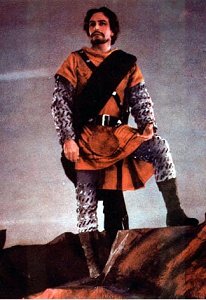 |
Fun
Sequels
|
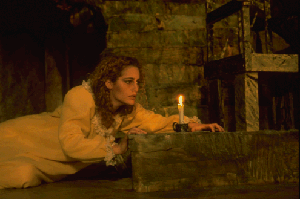 More Help for Students
More Help for Students
AC Bradley's "Shakespearean Tragedy"
James Bride, a cyberfriend of mine, has prepared helping learning tools for students approaching Shakespeare, including a helping interactive CD-ROM on "Macbeth".
His site is presently under construction.
Freud wrote on
Macbeth -- a humane essay by the great (if flawed) psychiatrist -- but I cannot
find his remarks online. Please let me know if they ever appear.
Artemis Film Guide by my cyberfriend Judy Lewis.
Videodisk intended for teachers.
Macbeth -- "Online Literature"; text and some notes, but the links are to ads
Spark Notes on Shakespeare
Macbeth Plugged
Wikipedia
Play Shakespeare
Warning: Every English teacher dreams of
catching a student plagiarizing. Unless your teacher is computer-illiterate,
he/she has very likely obtained some free / cheap prewritten papers.
And you know the likelihood of one of your classmates
turning in the same paper.
In either situation, you get caught, you get expelled,
everybody makes fun of you, and you can forget about being a doctor,
lawyer, or whatever. And you'll be getting what you deserve. People
will even say it's your "tragic flaw". Ha, ha!
turnitin.com -- anti-plagiary software.
Plagtracker.com -- a new, free plagiary-catcher service
Shakespeare Playing Cards
My favorite of the movie versions is Roman Polanski's dark and
(in Macbeth's time) accurate vision
of a world in which murder is normal means of achieving power.
(Do you think these is a connection to the events of Mr. Polanski's life?
Remember he had already made "Repulsion" and "Rosemary's Baby" BEFORE the murder of his wife.
You decide.)
Other movie adaptations include "Joe Macbeth" and "Men of Respect" -- both
gangster tales, a contemporary version from India called
Maqbool (link is down),
and "Throne of Blood", a classic samurai version.
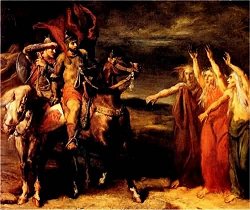
| |
One very clever student pointed out to me that Bottom's speech
about a tyrant describes Macbeth, and Macbeth's speech about
"a poor player" describes Bottom!
Another very clever student pointed out to me that at the beginning of the play,
Macbeth is mopey and quiet and has hallucinations, and Lady Macbeth
is verbally abusive. At the end of the play, Lady Macbeth is mopey
and quiet and has hallucinations, and Macbeth is verbally abusive.
One easy theme is that of sleep.
Macbeth, for whom life is a painful
meaningless enterprise, speaks of Duncan sleeping peacefully in
death "after life's fitful fever"; part of
Macbeth's own punishment is to be an
insomniac, and Lady Macbeth's is to sleepwalk.
My correspondent Gianfranco Gauci has suggested that
perhaps Macbeth purchases poison from the physician and uses it to
kill his wife. The patient dealing with psychological guilt
"must minister to himself" -- either by repentance (as I've always assumed)
or by suicide. A director could have Macbeth look the doctor squarely
in the face, hand him money; the doctor smiles knowingly and give him
a bottle and Macbeth then pours it into something on Lady Macbeth's
nightstand from the sleepwalking scene. After all, Macbeth doesn't seem
surprised by his wife's death, merely annoyed that the body was found
when it was. Something wicked this way comes. You decide.
and lack of surprise at the timing of her death
|

You already know that most (not all) "clan" tartans are inventions
from the 1800s (when Sir Walter Scott's novels became
popular). Whatever the historical Macbeth may have worn,
they are still fun. See scottishtartans.org
and here
for more information.

The MacBeth Tartan |

 Two Macduff Tartans
Two Macduff Tartans
|

The MacAlpin Tartan |

One of the Many MacDonald Tartans |

A Ross Hunting Tartan |

The Lennox Tartan |
|
Hi, My Name's Ed!
Edward has long been the most popular of the "Ed" names (Edwin, Edgar, and
Edmund are all still in use; all are of medieval English origin.)
The name because popular because of Edward
the Confessor, a good man whose saintliness (celebrated in Macbeth),
contrasts with his Scotch counterpart's nastiness. William the
Conqueror put the "saint" spin on Edward, from whom he traced
his pretended rightful claim to the English throne.
In the year I was born, "Edward" was the eighth most common
name for a baby boy. Today it is fairly uncommon.
Winnie-the-Pooh's first name is Edward.
Being an Edward, it's fun to ask
other people with "Ed" on their nametags which they are.
I think that "Ed" is the shortest name by which a male in the US
is likely to go.
I met my first "Ned", an older
nickname for any "Ed" name, online in late 2002. Edmund Moriarty, who was
playing
the cream-faced loon at West End, pointed out an alternative
explanation for why "Macbeth" is supposed to be bad luck. The play was very
popular in the 1800's, and a theater company that was about to fail would
produce it in a last-ditch attempt to survive.
|
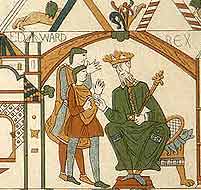
|
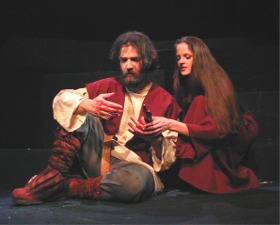
|
Macbeth, in a manner most flighty,
Aspired to the high and the mighty.
Urged on by his wife,
He stuck in his knife,
And the blood got all over his nightie!
Rule 9: Don't ... DON'T ... nag! -- Dale Carnegie on marriage
|
|
Shakespeare's Sonnets.
A remarkable sequence even by today's standards. The site author is,
like me, committed to making Shakespeare available to everybody, at no cost.
Enjoy.
shakespeare.about.com --
lots of good contemporary essays.
Searchable Text
Absolute Shakespeare. Good introductions!
No Fear -- text along with 21st-century English translation
Teachers: Click here
to begin your search for online essays intended for would-be plagiarists.
"Dishonesty was your tragic flaw, kid!" Good luck.
|
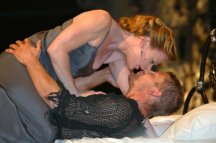
|
To the best of my knowledge, all the links
on my literature pages are to free sites. In August 2000, the operator of
the large for-profit help-with-homework online Shakespeare site offered to
buy these pages out "for a price in the low four figures." I refused,
and the site owner replied that "I wish you would just close down the
domain and spare everybody from a lot of wasted time. It's a shame."
This site will always remain free, to help everybody enjoy the
works that I have, myself, enjoyed so much. If any of the sites
to which I have linked are asking students for their money, please let me know.
 Words and phrases by Shakespeare -- under development
Words and phrases by Shakespeare -- under development
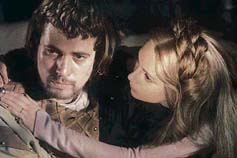
|
"What is there about Shakespeare that would interest a contemporary
American?"
Visitors send me this question from time to time.
If being a "contemporary American" means being focused on
dirty TV sitcoms, greed, casual sex, big-money sports,
shout-and-pout grievance-group
politics, televangelism, professional wrestling, crybabies, slot machines,
postmodernism,
political action committees,
and "war on drugs" profiteering...
then the answer is probably
"Nothing."
If a contemporary American can still ask, "Is life
just a meaningless exercise in status-seeking,
or is there anything to give us hope
that morality is real?" -- then the answer is maybe that
"Shakespeare deals with basic human issues."
|
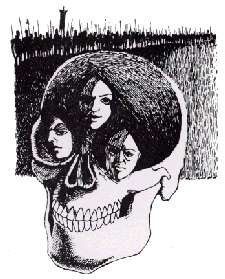 Antony & Cleopatra -- just getting started
Antony & Cleopatra -- just getting started
Hamlet
Julian of Norwich
King Lear
Julian of Norwich
La Belle Dame Sans Merci
A Midsummer Night's Dream
Moby Dick
Oedipus the King -- including something about the "tragic hero" business and "predestination"
If you are asked to write about Shakespeare's "tragic heroes" or
their "tragic flaw" or predestination
or whatever, help yourself to my skeptical
notes on Aristotle.
You may find it more rewarding to focus on something at once
more obvious and more profound.
Shakespeare (even more so than Sophocles) is writing about real-life, flesh-and-blood people
("tragic flaws" -- nobody always acts smart)
who live in an imperfect world ("tragic choices").
In Shakespeare, our sympathies are usually divided among the characters.
For this reason, Aristotle's thoughts on tragedy (i.e., people
are imperfect)
really seem more useful in discussing Shakespeare than in
discussing Sophocles.
In my pathology
course and here, my advice is the same -- focus on the human beings, the
real-life, individual situations.
The Book of Thel
Prometheus Bound
The Knight's Tale
The Seven Against Thebes
The Tyger
Timbuctoo
Twelfth Night
|
I've received several requests for my thoughts on Othello,
and wish I had time to put something together. For now, if you're asked to
write on the play, here are two ideas.
(1) Look at the short story that provided
the plot
(click here
or
here),
and notice how Shakespeare has portrayed racism as it really is in
our world. Ordinary decent folks (i.e., the Venetian government) care only
who a person is and what that person can do. They consider Brabantio
a jerk for accepting a person of another race as a friend but not as a son-in-law.
Iago, who for whatever reason
has a chip on his shoulder, spews racial venom for his own dark reasons.
Desdemona is originally frightened by someone who looks different, but
quickly learns to love that person so that race become indifferent.
(2) It is very common for special-forces operatives who return to
civilian life and/or who try to sustain a marriage to have terrible
difficulties. Those who are
successful deserve our special admiration. Too many become
terribly confused and end up in self-destructive behaviors,
both loving and hating. It's one of our world's
strangest ironies that romantic love is more treacherous and incomprehensible
than war.
|

|
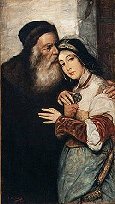 |
Likewise, it'll be a while before I can put anything online about "The
Merchant of Venice." I do want to take a minute to ask people
considering Shakespeare's presentation of Shylock to consider his era.
In all but Shakespeare's earliest plays, our sympathies are always
divided.
Shakespeare's English
contemporaries would seldom or never see a real Jew (they had been expelled
from England in 1280), and
the "stage Jew" of the time was an evil, comic figure.
Nevertheless, Shakespeare is the first writer to present a Jew as a human
being. And it is easy to understand
why Shylock is bitter and angry. Even at the beginning,
the protagonists of the play talk trash
to him simply because he is a Jew, obviously without even thinking.
It's impossible not to notice this. They invite Shylock to
their party simply so that his daughter can rob him,
and afterwards they are only amused when his feelings are trampled.
The play is actually about anger --
and Shakespeare has chosen a Jew to represent somebody who is right
to be angry. This is more than a progressive choice -- it must have taken
a great deal of courage.
Defending himself, Shylock points out the evils of slavery, which
the Jews did not practice but which was accepted at the time by some
Christians. (It was illegal in Shakespeare's England but would soon
re-emerge in the colonies.)
The most famous speech ("The quality of mercy...")
anticipates what I've found to be Shakespeare's greatest theme, i.e.,
in a godless universe, our only hope is to be kind to one another.
No matter what your grievance is, why not be the first to
take the brave step to end the stupid hatreds that darken our world?
|
|
Shakespeare's "Romeo and Juliet" may have been spoiled for you as required reading in high
school, and/or by parodies of the balcony scene and/or a bad (left-wing, right-wing) college
"Western Civ" course. Think: The play's about godawful teenaged murder-suicide. (Juliet is 14,
Romeo 16.) Shakespeare's
plot-source
was a warning to teenagers to obey their parents. The
themes of the play, which were pretty-much new with Shakespeare and very radical in his time, are
(1) young people ought to be allowed to marry for love, not just whoever their parents choose for
them; (2) young people's tragedies likely result from their parents' stupidity and meanness; (3) love
matures people, and gives dignity, meaning, and beauty even in the worst of circumstances. By
the way, did you notice that Papa Capulet is an old guy ("past [his] dancing days",
thirty years since he was "in a mask"), but Mama Capulet
was pregnant with Juliet at age 13. In other words, she was the old
lecher's forced child-bride and she is setting up the same thing for Juliet.
Forced marriage is still common (and the typical cause for a young girl's suicide)
in much of our world. Did you also notice that the Capulets are not terribly
surprised to find Juliet dead on her wedding day?
The fact that forced marriage is illegal in the United States and England
may be due, at least in part, to the fact that we listened
when Shakespeare showed us who we are. For this, I'm thankful.
| 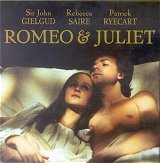 |

 I'm Ed. I'm an MD, a
pathologist in Kansas City,
a mainstream Christian.
a modernist, a
skydiver, an adventure gamer,
the world's busiest free
internet physician,
and a man who still
enjoys books and ideas.
I'm Ed. I'm an MD, a
pathologist in Kansas City,
a mainstream Christian.
a modernist, a
skydiver, an adventure gamer,
the world's busiest free
internet physician,
and a man who still
enjoys books and ideas.
Have you a weird sister? An odd brother? -- Richard Armour
on Macbeth
I hope you like Macbeth, and that I've been of some help.
Visit my home page
E-mail me
Brown University,
Department of English -- my home base, 1969-1973.
Fellow English majors -- Okay, okay, I know the commas are "supposed" to go inside the
quotation marks and parentheses. This became standard to protect fragile bits of movable type. My practice lets me know I'm the one who's
typed a particular document. And yes, I know it's supposed to be "I talk plainly."

 |
Taser Video
83.4 MB
7:26 min |
 | |
Click here to
see the author prove you can have fun skydiving without being world-class.
Click here to see the author's friend, Dr. Ken Savage,
do it right.
|
|
|
New visitors to www.pathguy.com
reset Jan. 30, 2005: |
Teens:
Stay away from drugs, work yourself extremely hard in class or
at your trade, play sports if and only if you like it,
and get out of abusive relationships by any means.
If the grown-ups who support you are "difficult", say and act
like you love them even if you're not sure that you do.
It'll help you and them.
The best thing anybody can say about you is, "That kid likes to
work too hard and isn't taking it easy like other young people." Health and friendship.
"Dead Rock Stars" Video
 |
Lady Macbeth may or may not have taken her
own life. But suicide is almost certainly a bad idea.
Among young people who made serious attempts and
failed, 99% said a year later that they are glad they failed. |



| | Travis Morgan -- gym buddy, skydiver, long-term friend --
has a new site to help ordinary folks catch computer misbehavior.
|





 Young people
who know of Shakespeare
from "Shakespeare Gardens" and "Beautiful Tales for Children"
may be surprised by what happens in Macbeth.
Young people
who know of Shakespeare
from "Shakespeare Gardens" and "Beautiful Tales for Children"
may be surprised by what happens in Macbeth.

 Shakespeare got his story from Raphael Holinshed's Chronicles.
You'll need to decide for yourself whether Shakespeare himself knew the
story was already fictionalized; Shakespeare's altered it again to
clear Banquo, King James's legendary ancestor, of complicity in the murder.
It's a fun read. Click here
to read Holinshed.
Holinshed spends a lot of time on the incident in which
Malcolm (who became a popular king) tests Macduff
by pretending to be mean when he is really nice.
Holinshed talks about the murder of King Duff by Donwald
in the century before Macbeth. According to Holinshed,
Donwald
was nagged by his wife until he did the evil deed, and drugged the guards.
Shakespeare adapted this for Macbeth.
Shakespeare got his story from Raphael Holinshed's Chronicles.
You'll need to decide for yourself whether Shakespeare himself knew the
story was already fictionalized; Shakespeare's altered it again to
clear Banquo, King James's legendary ancestor, of complicity in the murder.
It's a fun read. Click here
to read Holinshed.
Holinshed spends a lot of time on the incident in which
Malcolm (who became a popular king) tests Macduff
by pretending to be mean when he is really nice.
Holinshed talks about the murder of King Duff by Donwald
in the century before Macbeth. According to Holinshed,
Donwald
was nagged by his wife until he did the evil deed, and drugged the guards.
Shakespeare adapted this for Macbeth.


 Around 1950, scholars noticed and argued the obvious. Macbeth
was written specifically to be performed for, and to please,
King James I.
Around 1950, scholars noticed and argued the obvious. Macbeth
was written specifically to be performed for, and to please,
King James I.
 As you go through the play, look for the repeated theme of
"What is a real man?" Like nowadays,
there is no consensus.
As you go through the play, look for the repeated theme of
"What is a real man?" Like nowadays,
there is no consensus.
 Previous stage villains, notably Shakespeare's Aaron and Richard III,
do not reach the Macbeths' depth. Aaron gloats on his misbehavior,
and Richard acts the villain until the end.
Your instructor may talk about Macbeth beginning as a good and fine
man, possessing the tragic flaw of ambition,
upsetting the divinely-ordained natural order, and so
forth. You'll need to decide for yourself about this.
On the one hand, the other characters talk about Duncan
as being "meek", very likable and kindly, and so forth.
And people do seem to be dismayed over the murder.
On the other hand,
Macbeth seems -- from the play's bloody beginning --
to be one of many thugs
in a society in which power is gained and maintained by
killing other thugs, and where loyalty is at best provisional.
Lady Macbeth doesn't seem to think
that there's anything really unusual about the idea of
murdering a guest, and she assumes it's occurred to her husband
as well. You could get a good paper by arguing one side, or both --
does Shakespeare believe that there is a deep morality underpinning
human society, or does he not believe this, or does he let you decide?
Previous stage villains, notably Shakespeare's Aaron and Richard III,
do not reach the Macbeths' depth. Aaron gloats on his misbehavior,
and Richard acts the villain until the end.
Your instructor may talk about Macbeth beginning as a good and fine
man, possessing the tragic flaw of ambition,
upsetting the divinely-ordained natural order, and so
forth. You'll need to decide for yourself about this.
On the one hand, the other characters talk about Duncan
as being "meek", very likable and kindly, and so forth.
And people do seem to be dismayed over the murder.
On the other hand,
Macbeth seems -- from the play's bloody beginning --
to be one of many thugs
in a society in which power is gained and maintained by
killing other thugs, and where loyalty is at best provisional.
Lady Macbeth doesn't seem to think
that there's anything really unusual about the idea of
murdering a guest, and she assumes it's occurred to her husband
as well. You could get a good paper by arguing one side, or both --
does Shakespeare believe that there is a deep morality underpinning
human society, or does he not believe this, or does he let you decide?
 Fair is foul and foul is fair.
In Macbeth, things are seldom what they
seem, and we often don't know what's really
happening. The play is full of ambiguity and double
meanings, starting with the prophecies.
The day is extremely foul (weather) and
extremely fair (MacDonald has been disemboweled.)
Banquo is not so happy, yet much happier.
Is the dagger a hallucination, or a supernatural phantom?
Ask the same question about Banquo's ghost.
Does the bell summon Duncan "to heaven or to hell"?
One of Duncan's son's called out "Murder!" in his
sleep, but the other one laughed, mysteriously
pleased at his father's death. Which was which?
Liquor "equivocates" with the porter's sexuality.
Does Macbeth say "Had I but died an hour...." because
he is really sorry (i.e.,
sad about his moral deterioration and/or realizing he's getting
himself into trouble),
or just overacting?
Does Lady Macbeth really faint? ("Perhaps she is actually a person
of more sensitive feelings than she lets on.")
Or does she simply pretend to faint to
divert attention from her husband's overacting?
Who's the third murderer?
Is Ross playing both sides?
Is Lennox, who overheard Macbeth's plot against Macduff after the party,
the messenger who warns her too late?
Does Lady Macbeth commit suicide or die of cardiac complications?
What is Lady Macbeth writing
in her sleepwalking scene? A confession? A suicide note? A last love
letter to a neglectful husband?
(My correspondent Terilyn J. Moore, who has taught the play for many years
in high school and also shared the idea about Lennox and Lady Macduff,
tells me that she invites class members to
reproduce what Lacy Macbeth might have written.)
There's a lot of talk about clothing -- clothes give you
an identity and also conceal who you are.
These mysteries add to the literal fog on-stage.
Fair is foul and foul is fair.
In Macbeth, things are seldom what they
seem, and we often don't know what's really
happening. The play is full of ambiguity and double
meanings, starting with the prophecies.
The day is extremely foul (weather) and
extremely fair (MacDonald has been disemboweled.)
Banquo is not so happy, yet much happier.
Is the dagger a hallucination, or a supernatural phantom?
Ask the same question about Banquo's ghost.
Does the bell summon Duncan "to heaven or to hell"?
One of Duncan's son's called out "Murder!" in his
sleep, but the other one laughed, mysteriously
pleased at his father's death. Which was which?
Liquor "equivocates" with the porter's sexuality.
Does Macbeth say "Had I but died an hour...." because
he is really sorry (i.e.,
sad about his moral deterioration and/or realizing he's getting
himself into trouble),
or just overacting?
Does Lady Macbeth really faint? ("Perhaps she is actually a person
of more sensitive feelings than she lets on.")
Or does she simply pretend to faint to
divert attention from her husband's overacting?
Who's the third murderer?
Is Ross playing both sides?
Is Lennox, who overheard Macbeth's plot against Macduff after the party,
the messenger who warns her too late?
Does Lady Macbeth commit suicide or die of cardiac complications?
What is Lady Macbeth writing
in her sleepwalking scene? A confession? A suicide note? A last love
letter to a neglectful husband?
(My correspondent Terilyn J. Moore, who has taught the play for many years
in high school and also shared the idea about Lennox and Lady Macduff,
tells me that she invites class members to
reproduce what Lacy Macbeth might have written.)
There's a lot of talk about clothing -- clothes give you
an identity and also conceal who you are.
These mysteries add to the literal fog on-stage. Macbeth
Top 10
Macbeth
Top 10

 More Help for Students
More Help for Students










 Words and phrases by Shakespeare
Words and phrases by Shakespeare













